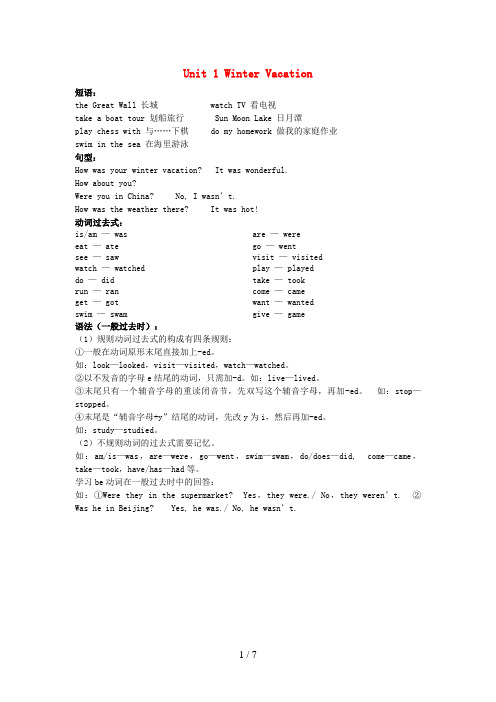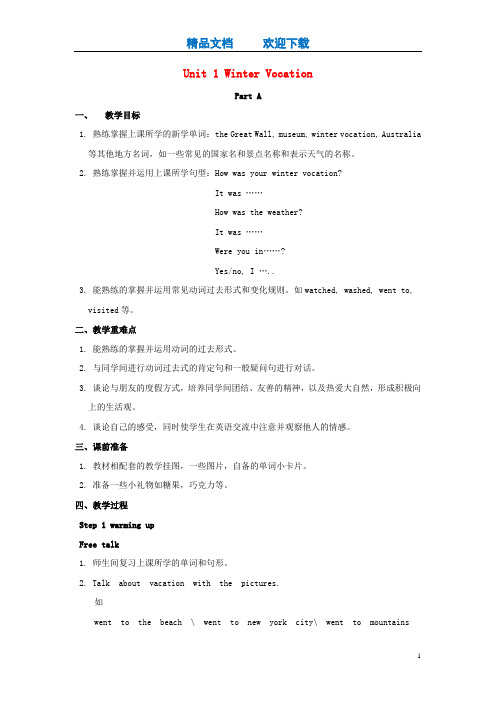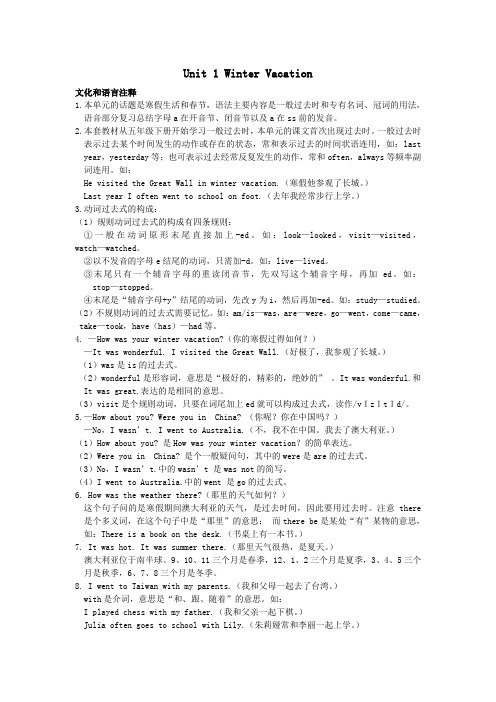五年级英语下册 Unit 1《Winter Vacation》(Part A)课件2 (新版)闽教版
- 格式:ppt
- 大小:1.20 MB
- 文档页数:8

闽教版小学英语五年级下册全册课文文本Unit 1 Winter Vacation(寒假)Part AHi, Lily. How was your winter vacation? 你好,莉莉。
你的寒假过得怎么样?It was wonderful. I visited the Great Wall. 很精彩。
我参观了长城。
How about you? Were you in China? 你呢?你寒假有在中国吗?No, I wasn’t. I went to Australia. 不,没有。
我去了澳大利亚。
How was the weather there? 那的天气怎么样?It was hot. It was summer there. 很热。
那里是夏天。
巩固练习A: How was your winter vacation? 你的寒假过得怎么样?B: It was wonderful.I visited the Great Wall. 我参观了长城。
I went to Australia. 我去了澳大利亚。
I visited the museum. 我参观了博物馆。
I watched TV. 我看了电视。
Part BHi, boys and girls! 嗨,孩子们!Hi, Miss Gao. 嗨,高老师。
How was your winter vacation? 你们的寒假过得怎么样?I went to Taiwan with my parents. 我和父母去了台湾。
Is it your hometown?那里是你的故乡吗?Yes, it is. 是的,台湾是我的故乡。
I took a boat tour of Sun Moon Lake. 我乘船游览了日月潭。
How about you, Yang Ming? 你呢,杨明?I played chess with my father. 我和爸爸下了棋。

Unit 1 Winter Vacation短语:the Great Wall 长城 watch TV 看电视take a boat tour 划船旅行 Sun Moon Lake 日月潭play chess with 与……下棋 do my homework 做我的家庭作业swim in the sea 在海里游泳句型:How was your winter vacation? It was wonderful.How about you?Were you in China? No, I wasn’t.How was the weather there? It was hot!动词过去式:is/am — was are — wereeat — ate go — wentsee — saw visit — visitedwatch — watched play — playeddo — did take — tookrun — ran come — cameget — got want — wantedswim — swam give — game语法(一般过去时):(1)规则动词过去式的构成有四条规则:①一般在动词原形末尾直接加上-ed。
如:look—looked,visit—visited,watch—watched。
②以不发音的字母e结尾的动词,只需加-d。
如:live—lived。
③末尾只有一个辅音字母的重读闭音节,先双写这个辅音字母,再加-ed。
如:stop—stopped。
④末尾是“辅音字母+y”结尾的动词,先改y为i,然后再加-ed。
如:study—studied。
(2)不规则动词的过去式需要记忆。
如:am/is—was,are—were,go—went,swim—swam,do/does—did, come—came,take—took,have/has—had等。
学习be动词在一般过去时中的回答:如:①Were they in the supermarket? Yes,they were./ No,they weren’t. ② Was he in Beijing? Yes, he was./ No, he wasn’t.Lesson 27Unit6 I’ll make a beautiful cardPeriod 1Teaching Goals:1.Learn new words.2.Learn the text.3.Know something about M other’s Day.Teaching Point:Know something about M other’s Day.Teaching Preparations:Tape and pictures.Teaching Process:1.Warming Up(1)Greetings(2)Review2.Presentation and Drills(1)Learn new words.Mother’s Day favourite chocolateRose celebrate restaurant(2)Learn Part ANext Sund ay is Mother’s Day.What will you do for your mother,Lingling? That’s good.I’ll make a beautiful card for her.On the card I’ll write “Happy Mother’s Day”.What about you,Peter?That’s good.I’ll buy her a box of her favourite chocolates.I’ll buy some flo wers for my mother.She likes roses.My father and I will cook a delicious dinner to celebrate Mother’s Day.(3)Learn Part BMonths of the year.Mother’s Day restaurant gift roseA box of chocolates(4)Learn Part CLet’s PractiseI’ll make a beautiful card.Happy Mother’s Day!Role play.Mum,I have a small gift for you.Thank you!Open it ,please.It’s beautiful.I love it.Happy Mother’s Day!Period 2Teaching Goals:1.Review the words.2.Review the text.3. Know something about M other’s Da y.4.Can do the exercises.Teaching Point:Master reading skill.Teaching Preparations:Exercises and picturesTeaching Process:1.Warming Up(1)Greetings(2)Review2.Presentation and Drills(1)Learn Part DLet’s ReadRead the text of Part D.Do the exercises of Part D.Talk about Part D.(2)Learn Part ELet’s WriteWrite about Mother’s Day.Mother’s Day is on the second Sunday in ___________Children want to make their mothers___________on this day.They write nice things to their mothers on Mot her’s Day___Some children like to make their own__________or cards for their mothers.Some families will have a delicious dinner to _____Mother’s Day.(3)Learn Part FFold your coloured paper in half.Draw beautiful pictures on the front.Inside write some nice things to your mother and draw some nice pictures to make your card beautiful.Unit 6 Work quietly笔试部分一、写出下列动词的 ing形式。

Unit 1 Winter VocationPart A一、教学目标1. 熟练掌握上课所学的新学单词:the Great Wall, museum, winter vocation, Australia等其他地方名词,如一些常见的国家名和景点名称和表示天气的名称。
2. 熟练掌握并运用上课所学句型:How was your winter vocation?It was ……How was the weather?It was ……Were you in……?Yes/no, I …..3. 能熟练的掌握并运用常见动词过去形式和变化规则。
如watched, washed, went to,visited等。
二、教学重难点1. 能熟练的掌握并运用动词的过去形式。
2. 与同学间进行动词过去式的肯定句和一般疑问句进行对话。
3. 谈论与朋友的度假方式,培养同学间团结、友善的精神,以及热爱大自然,形成积极向上的生活观。
4. 谈论自己的感受,同时使学生在英语交流中注意并观察他人的情感。
三、课前准备1. 教材相配套的教学挂图,一些图片,自备的单词小卡片。
2. 准备一些小礼物如糖果,巧克力等。
四、教学过程Step 1 warming upFree talk1.师生间复习上课所学的单词和句形。
2.Talk about vacation with the pictures.如went to the beach \ went to new york city\ went to mountains\visit somebody \visit museums went to summer camp.A: where did you go for vocation?B: I visited \went to\ stayed at …Step 2 presentation1.教师重点讲解本课语法:动词的过去式。
2.教师在黑板上板书动词过去式的变化规则:一般直接加ed, 如looked, played,visited.还有其他特殊形式,如:saw, went, did 等Step 3 practice1.老师请学生上黑板进行动词的过去式听写,看谁写的又快要好,表现优异者可获得奖励。

Unit 1 Winter Vacation文化和语言注释1.本单元的话题是寒假生活和春节,语法主要内容是一般过去时和专有名词、冠词的用法,语音部分复习总结字母a在开音节、闭音节以及a在ss前的发音。
2.本套教材从五年级下册开始学习一般过去时,本单元的课文首次出现过去时。
一般过去时表示过去某个时间发生的动作或存在的状态,常和表示过去的时间状语连用,如:last year,yesterday等;也可表示过去经常反复发生的动作,常和often,always等频率副词连用。
如:He visited the Great Wall in winter vacation.(寒假他参观了长城。
)Last year I often went to school on foot.(去年我经常步行上学。
)3.动词过去式的构成:(1)规则动词过去式的构成有四条规则:①一般在动词原形末尾直接加上-ed。
如:look—looked,visit—visited,watch—watched。
②以不发音的字母e结尾的动词,只需加-d。
如:live—lived。
③末尾只有一个辅音字母的重读闭音节,先双写这个辅音字母,再加ed。
如:stop—stopped。
④末尾是“辅音字母+y”结尾的动词,先改y为i,然后再加-ed。
如:study—studied。
(2)不规则动词的过去式需要记忆。
如:am/is—was,are—were,go—went,come—came,take—took,have(has)—had等。
4. —How was your winter vacation?(你的寒假过得如何?)—It was wonderful. I visited the Great Wall.(好极了,我参观了长城。
)(1)was是is的过去式。
(2)wonderful是形容词,意思是“极好的,精彩的,绝妙的” 。
It was wonderful.和It was great.表达的是相同的意思。


闽教版小学英语五年级下册Unit1课文原文及翻译Unit 1 Winter Vacation第一单元寒假Part AA部分1. Listen and follow.听录音并跟读。
Hi, Lily!嗨,莉莉!How was your winter vacation?你寒假过得怎么样?It was wonderful.过得很精彩。
I visited the Great Wall.我参观了长城。
How about you?你呢?Were you in China?你在中国过的寒假吗?No, I wasn't.没有。
I went to Australia.我去了澳大利亚。
How was the weather there?那里的天气怎么样?It was hot.很热。
It was summer there.那里是夏天。
2. Ask and answer.你问我答。
I visited the Great Wall.我参观了长城。
I went to Australia.我去了澳大利亚。
I visited the museum.我参观了博物馆。
I watched TV.我看了电视。
1.How was your winter vacation?你寒假过得怎么样?It was wonderful.过得很精彩。
I visited the Great Wall.我参观了长城。
2.How was your winter vacation?你寒假过得怎么样?It was wonderful.过得很精彩。
I went to Australia.我去了澳大利亚。
3.How was your winter vacation?你寒假过得怎么样?It was wonderful.过得很精彩。
I visited the museum.我参观了博物馆。
4.How was your winter vacation?你寒假过得怎么样?It was wonderful.过得很精彩。
Unit 1 Winter Vacation文化和语言注释1.本单元的话题是寒假生活和春节,语法主要内容是一般过去时和专有名词、冠词的用法,语音部分复习总结字母a在开音节、闭音节以及a在ss前的发音。
2.本套教材从五年级下册开始学习一般过去时,本单元的课文首次出现过去时。
一般过去时表示过去某个时间发生的动作或存在的状态,常和表示过去的时间状语连用,如:last year,yesterday等;也可表示过去经常反复发生的动作,常和often,always等频率副词连用。
如:He visited the Great Wall in winter vacation.(寒假他参观了长城。
)Last year I often went to school on foot.(去年我经常步行上学。
)3.动词过去式的构成:(1)规则动词过去式的构成有四条规则:①一般在动词原形末尾直接加上-ed。
如:look—looked,visit—visited,watch—watched。
②以不发音的字母e结尾的动词,只需加-d。
如:live—lived。
③末尾只有一个辅音字母的重读闭音节,先双写这个辅音字母,再加ed。
如:stop—stopped。
④末尾是“辅音字母+y”结尾的动词,先改y为i,然后再加-ed。
如:study—studied。
(2)不规则动词的过去式需要记忆。
如:am/is—was,are—were,go—went,come—came,take—took,have(has)—had等。
4. —How was your winter vacation?(你的寒假过得如何?)—It was wonderful. I visited the Great Wall.(好极了,我参观了长城。
)(1)was是is的过去式。
(2)wonderful是形容词,意思是“极好的,精彩的,绝妙的” 。
It was wonderful.和It was great.表达的是相同的意思。
Unit 1 Winter Vacation文化和语言注释1.本单元的话题是寒假生活和春节,语法主要内容是一般过去时和专出名词、冠词的用法,语音部分复习总结字母a在开音节、闭音节以及a在ss前的发音。
2.本套教材从五年级下册起先学习一般过去时,本单元的课文首次出现过去时。
一般过去时表示过去某个时间发生的动作或存在的状态,常和表示过去的时间状语连用,如:last year,yesterday等;也可表示过去常常反复发生的动作,常和often,always等频率副词连用。
如:He visited the Great Wall in winter vacation.(寒假他参观了长城。
)Last year I often went to school on foot.(去年我常常步行上学。
)3.动词过去式的构成:(1)规则动词过去式的构成有四条规则:①一般在动词原形末尾干脆加上-ed。
如:look—looked,visit—visited,watch—watched。
②以不发音的字母e结尾的动词,只需加-d。
如:live—lived。
③末尾只有一个辅音字母的重读闭音节,先双写这个辅音字母,再加ed。
如:stop—stopped。
④末尾是“辅音字母+y”结尾的动词,先改y为i,然后再加-ed。
如:study—studied。
(2)不规则动词的过去式须要记忆。
如:am/is—was,are—were,go—went,come—came,take—took,have(has)—had等。
4. —How was your winter vacation?(你的寒假过得如何?)—It was wonderful. I visited the Great Wall.(好极了,我参观了长城。
)(1)was是is的过去式。
(2)wonderful是形容词,意思是“极好的,精彩的,绝妙的” 。
It was wonderful.和It was great.表达的是相同的意思。